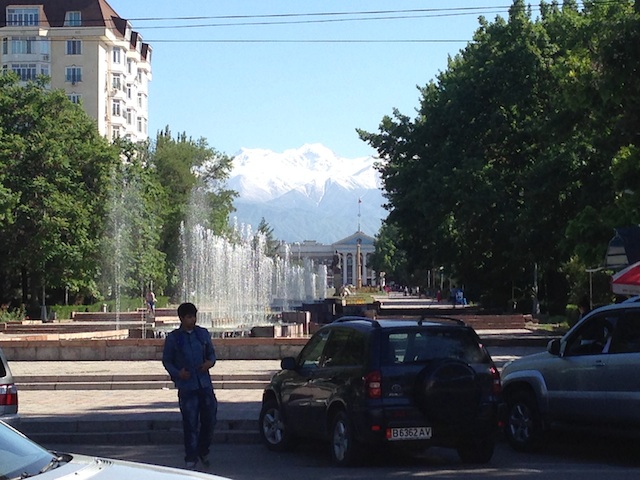Nonprofit Management Conference
This week we had a conference at Kyrgyzstan National University, the oldest university in the country. Established in 1925, today the university has about 25,000 students. It is a strange campus because there are areas with beautiful white marble floors and there are areas with rotting wood floors that creak with every step. There is no wi-fi. There are computers with internet access in a few rooms, but the students are limited to a certain number of hours a day of use. It was a good place for the conference because it has one of the few halls in the city big enough to seat the number of people who attended, and because it is a public school, it showed we had support from the academic sector and the government.
In some ways the conference was like an American conference. There were lectures, coffee breaks, VIPs, and day-of-event changes that caused minor panic. Unlike most conferences I've been to, there were issues of translation, last-minute changes to the speaker list, and frequent phone calls and walk-outs during presentations. As an American, I'm used to people at least pretending to be interested in the person at the front of the room, but the standards are different here. I've had to adjust my expectations and force myself not to judge an action as rude based on my standards of decorum.
The title of the conference was The First Annual Conference on Nonprofit Management: “Kyrgyz Civil Society Sector in Theory and Practice." We invited rectors, business-owners, and members of the government, though the majority of participants were from the civil society sector (non-commercial organizations) or academia. There were 137 attendees, including about 40 students. It was a great turnout, particularly because there was another conference in Almaty (capital of Kazakhstan, about 2-3 hours away) this week.
We had simultaneous translation in English, Russian, and Kyrgyz, depending on the speaker. A USAID officer, the Deputy Mission Director, made a statement in English and the rest was in Russian, so I had my headphones on almost the whole time. There was supposed to be a panel discussion on the stage, but one of the intended speakers expressed his preference to stay at his seat, so instead the speakers all stayed seated and gave their presentations from among the crowd. Again, it was something that I would not expect to see during an American conference. The VIPs all had microphones on their desks, so it worked out alright, but I was surprised by the change.
Some of the speakers were engaging and provided useful information about the nonprofit sector in Kyrgyzstan. The most compelling presentation came from a member of the government who worked in the nonprofit sector for years before entering government work. This is apparently a rare career move because most government positions go to the same families and to members of certain political groups. She spoke about the nonprofit sector as a necessary instrument for positive change in Kyrgyzstan.
Generally, members of civil society organizations were critical of the current system, the government officials spoke in generalities without taking any particular position, and the business-owners were disconnected from the process. During the Q&A session, the civil society organization leaders used the opportunity to advertise their organizations.
In the afternoon, about 35-40 people stayed to hear presentations of academic papers. Attendees could choose between a session on civil society in Kyrgyzstan and theoretical and pragmatic aspects of nonprofit sector development.
The response to the conference was very positive. People were grateful for the opportunity to exchange ideas and hear from new people. They also appreciated the networking opportunity. There was a general sense that this was the beginning of something important. I could not tell if this was a genuine sentiment, or something cultural that I missed, but it impressed me.
I was able to speak to a few people at the conference and I'm starting to see the reasons Kyrgyzstan is so poor. There are not many natural resources here, and those that do exist are not utilized effectively. For example, there is a lake in the mountains here, Issyk-Kul, which is one of the largest and deepest in the world. People come from all around Central Asia during the summer to stay at the resorts and cool off with water sports and hiking. It brings in some money, but the potential for income from tourists is significant and largely untapped, as far as I can tell. Another resource is minerals in the mountains. There is only one mining operation right now, but most of the country is made up of mountains with minerals of all kinds, waiting to be mined. Apparently foreign investors have tried to come in, but the government and competitors (mainly China, from what I understand) have prevented mining in most of the country.
As a result of the lack of jobs here, many of the young men go to neighboring countries or to Russia to work and send the money back to their families here.
It was helpful to learn more about the issues facing nonprofits in Kyrgyzstan. It seemed that everyone at the conference agreed they are necessary for economic and political progress. Kyrgyzstan is unique because it has accepted far more foreign aid than surrounding countries. Even so, it is the poorest country in the region. There is a movement within the government that is promulgating the idea that nonprofits are foreign agents. This leads to distrust of the sector as a whole, even when a nonprofit is domestically funded or is run entirely by nationals. At some point I will write about the situation with competing laws about nonprofit organizations, but I need to learn more first.
My next post will be about the other work I've been doing.
Paka!
Pictures are of the mall connecting Kyrgyzstan National University to the Mayor's Office and one of the public squares. 
